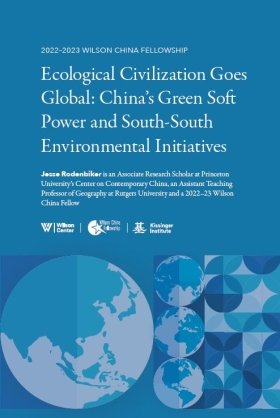Ecological Civilization Goes Global: China’s Green Soft Power and South-South Environmental Initiatives



China's involvement in Global South environmental and development issues is reshaping 21st century environmental governance. This report examines China's green soft power through multilateral and bilateral environmental initiatives and exchanges. It draws on interviews and fieldwork conducted during the COP-15 UN Convention on Biological Diversity and in Southeast Asia on environmental exchanges with China-based organizations. The report finds that China's environmental leadership in multilateral arenas has progressed significantly over recent decades as exhibited by successfully advancing the Kunming-Montreal Global Biodiversity Framework. However, the report finds China's ability to influence international actors to adopt shared values and positive associations to China is limited. The report, furthermore, examines case studies of state-state exchange in Thailand and civil society exchange in Indonesia. In each case, Chinese organizations provide essential support to advance local environmental goals. These exchanges, however, exhibit limited influence in shaping values and attitudes toward China, in part, because the field of international environmental exchange is highly saturated, particularly with international and Global North organizations. This indicates that China's green soft power, while on the rise globally, remains relatively weak. The report concludes that the relative weakness of China's green soft power is attributable to strong political economic alliances with Global North countries and international organizations, as well as China's fragmented authoritarian governance, which limits governance effectiveness in international environmental arenas. Rather than viewing green China rising as a threat, China's emerging environmental leadership harbors potential for enhancing international collaboration. Policymakers and civil society organizations can engage with Chinese organizations and emerging conservation networks in the Global South to work toward shared environmental goals and enhance global environmental governance.


The Kissinger Institute works to ensure that China policy serves American long-term interests and is founded in understanding of historical and cultural factors in bilateral relations and in accurate assessment of the aspirations of China’s government and people. Read more



